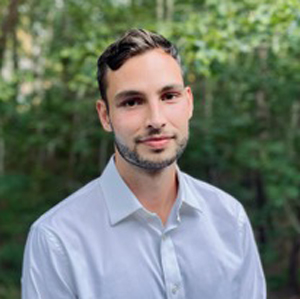
Statistics about religions are common in public discourse, whether questions of voting among
Christians in the US, increases in the number of religiously unaffiliated, or shifts in religious
practices. While such information can be highly convincing, the methods used to collect,
analyze, and classify that data greatly influence those stats and how we conceive of our world.
Aidan Nuttall has been developing these types of questions and analyses of the survey data.
Hailing from Whitman College in Washington State, Aidan is a second year MA student and
American Examples intern for the 2023-24 academic year. His interests lie in the way that
quantitative data is used in the humanities. Less of a digital humanist, Aidan is particularly
attentive to the way data collection tools process information and the classification systems
behind them—the production of data and the way the humanities function as a result.
Aidan’s time in the Religious Studies Master’s Program has given him the opportunity to study
religion in a rather unorthodox way. The department’s emphasis on critique, discourse, and
methods has helped him hone the ability to have conversations with a wide range of people
and effectively present his research to them. He has accumulated the tools to dive into the
questions that interest him the most: “How did we get this method?,” “Why are we using it?,”
and “What considerations do we need to take when using it?”
This past summer, Aidan applied such questions in an internship in the office of data and
evaluation of the NEH (National Endowment for the Humanities). He worked with four others
on data analysis for federal grants to the humanities. His focus was on quantitative analysis of
the performance and state of the humanities. Aidan spent his summer days dissecting financial
statements, studying the processes of related organizations, and interpreting academic
literature to better understand the present condition of the humanities.
Aidan also has worked in the assistantship position for American Examples for the 2023-2024
academic year. In this, he is using his logistical and organizational skills to coordinate the three
meetings of AE Fellows this year, and he assists in the preparation of publications from previous
groups. This experience has provided a different opportunity to sit in on countless hours of
conversations on American religions. As someone who aspires to go into academia, Aidan’s
time with AE has given him unique insight into the field and its future.
But what does this have to do with a degree in Religious Studies?
Aidan has used his time since coming to the University of Alabama to develop a variety of skills.
His experiences editing material for publication, evaluating data at the NEH, presenting
information to various audiences, and critiquing the methods used to develop statistics
combine to illustrate the range of skills that scholars in religious studies, and people in many
fields, need to develop. Whether working in the public sector advocating for the humanities, in
academic publishing, in the professoriate, or in private business, all of these skills enable better
communication, data collection, and analysis, illustrating the value of critical study in the
humanities.
This series highlights the range of accomplishments that students in Religious Studies achieve
while at the Capstone and in their lives after graduation. We all hear questions like, “What are
you going to do with a Religious Studies degree?” As this series makes clear, the skills that
students develop in Religious Studies, including critical thinking, interacting with diverse
viewpoints, social analysis, and the ability to communicate to multiple audiences, contribute to
a broad range of activities and careers.